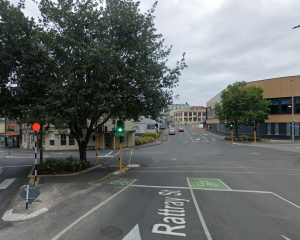A tragic driving accident which left her boyfriend permanently paralysed was the type of accident that could happen to anyone, Judge Dominic Flatley told a young woman in the Dunedin District Court yesterday.
The "loud and clear'' message was drivers needed to be vigilant at all times, the judge said.
Pippa Mary Lucas (20), apprentice horticulturist, of East Taieri, had admitted causing injury to Michael William Natzke by driving carelessly, on State Highway 87, at Middlemarch, on October 8 last year.
She was convicted, fined $350, court costs $132.89, and disqualified from driving for six months. Through counsel Brian Kilkelly, Lucas had made a "special reasons'' application for no driving disqualification, based on Mr Natzke's need for transport and her desire to be available to provide that transport.
While agreeing with police prosecutor Sergeant Ross Hutton that no disqualification was not appropriate because "special reasons'' applications had to relate to the offence or the offender, the judge told Lucas if the matter came back before him in 28 days he would look "very favourably'' on an application for a limited licence.
The summary said Lucas went to pick up the Mr Natzke from where he worked as a shearer, near Middlemarch, about 6.30pm.
Because Mr Natzke had had a small amount of alcohol, Lucas agreed to drive this Hilux utility, with him as her passenger.
Travelling on State Highway 87, Lucas slowly drifted left resulting in the ute's left wheels going on to a grass verge which dropped sharply into a water table.
Lucas began to correct the ute, it being uncontrollably pulled to the water table due to the drop-off. Mr Natzke also reacted, grabbing the steering wheel to help force the ute back to its correct place on the road.
As a result, the ute over-corrected and veered on to the wrong side of the road.
Lucas steered left and braked heavily, with the ute sliding and out of control. It went over the left side road edge and tipped on to its roof before colliding with a power pole and ending up on its roof in a paddock.
Lucas managed to get out of the ute. But the Mr Natzke had to be removed by the fire service.
Both he and Lucas were airlifted to hospital.
A neck fracture received in the crash led to Mr Natzke being permanently paralysed, with no body movement from the chest down.
Lucas was in breach of her restricted driver licence, Mr Natzke not having held a full driver licence for two years or more.
Spoken to, Lucas acknowledged veering off the side of the road and being unable to correct the situation. She could not explain why, other than she might have been distracted.
Mr Kilkelly said nothing the court could do could impact any more than what the defendant "lives with daily as a result of this''.
Mr Natzke had had a couple of drinks and would have been able to drive. But the defendant, who had not been drinking, agreed to drive.
A moment's inattention resulted in the vehicle going off the road "with devastating results''.
Mr Natzke was now medically classified as a tetraplegic and would be wheelchair-bound for the rest of his life. He remained totally supportive of the defendant.
The defendant, also injured in the accident, received a fractured skull, injury to her back and concussion, and was in hospital for four days.
The day after the accident, Mr Natzke was flown to Christchurch hospital. He was there for three weeks before being transferred to Burwood and was now living at a local motel until suitable other accommodation was found. Mr Natzke had decided to live in Dunedin. His family was in the North Island. The defendant was the only person who could provide support for him. He was going to need help in almost every aspect of his life.
"He feels it necessary to have the defendant around as part of his rehabilitation and that without her having a licence he would be virtually confined to his accommodation.''
The defendant's application for no disqualification was at Mr Natzke's request so she could be available to assist him in any way possible, Mr Kilkelly said.
Opposing the application, Sgt Hutton said there were not "special reasons'' relating to the offence or the offender. The appropriate course, after disqualification, was to apply for a limited licence.
Judge Flatley said the situation was difficult. Disqualification was a mandatory part of the penalty for the offence. By law, "special reasons'' must relate to the offence or the offender. He understood the defendant's desire to support Mr Natzke and his desire to have her available. There would be a disqualification. But the court would look favourably at an application for a limited licence.












